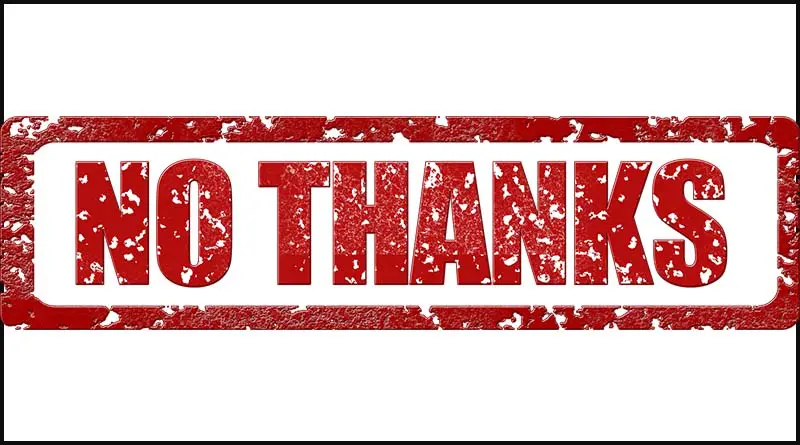You can do it. You can say no to that sales pitch.
We live in a world of “yes” men and women programmed to accept almost every offer in front of us.
Schools teach us to say “yes” because it makes us good little consumers who power the economy. Our politicians, especially in this day and age, often command a loyal army of lemmings who think, read and vote as they are instructed to.
Just say no to that sales pitch
And so how could you possibly say “no” when you’re faced with a sales pitch from a business? In a previous story, I explored the various ways you could resist these sales pitches. But the topic deserves some more exploration. As it turns out, a little information, careful observation and a playbook for turning down an offer can get you there.
The next time you feel cornered at a car dealership, appliance store or shopping mall, remember this: You’re either dealing with a predator or an amateur, or maybe both.
“Well-trained sales people don’t push,” explains sales expert Nancy Friedman, president of Telephone Doctor Customer Service Training. “Hard-sell salespeople push what they have to or are told to. They sell what’s hot in high commission and revenue. Whatever is the flavor of the day. They just want the sale. Often, they are not interested in helping or listening to the customers.”
The key to resisting the sales pitch
The key to resisting is information, says Shlomo Bregman, founder of Bregman Success, a sales training company.
“The more information you have entering into a sales environment, the more the seller will be disarmed and become more timid with you,” he explains. “Salespeople are not going to tell you that you can probably find something similar online for less, or what invoice price the dealership actually paid for the BMW that’s sitting on their lot.”
Fortunately, that information is available online. All you have to do is look for it. And when you find that the price on the sales floor exceeds what a reasonable person would pay, you know it’s not a good deal. And you can easily walk away.
Saying “no” also means understanding the game. Successful salespeople ask a series of in-depth questions under the guise of “educating” their prospect. (And often, they do.)
“Many times the prospect is looking to be educated,” says Mike Smith, founder of SalesCoaching1, a sales training company, “not sold.”
But a sales pitch is exactly what they get. Unfortunately, those detailed questions you’ve answered are now being used against you. You told the appliance salesperson that you were expecting house guests next week; wouldn’t this new washer and dryer be perfect if it could be delivered before they arrived? Never mind that house guests rarely notice your appliances. It’s the bed, but don’t even get me started with mattress salespeople — that’s a whole ‘nother column.
The Fix
Don’t answer the questions. If you must say something, deliver a vague, noncommittal reply. Because once a salesperson gets inside your head, it’s much harder to say “no.”
One more thing to look for, and which will help you say “no” much easily. Watch for things that don’t make any sense. Scott Wood, director of trade and wholesale operations at Carvana and a former former GM and Chrysler dealer, told me about one such ploy, called spiffing.
“At traditional dealerships aged units will often have some type of incentive — or spiff — payable to the salesperson if he or she sells any of them,” he explains. “Having these bonuses in place causes the sales staff to push those units to customers. It was not uncommon to see a salesperson working with folks on the lot, who would walk customers away from the vehicle they may be looking at, and over to the oldest cars in stock, so the salesperson could try their best to land them on one of the aged vehicles and make the extra commission.”
The act of sending you to another car, TV or appliance should send up warning flares. Even the words, “Let me show you something else” should make you suspicious. And when you hear it, you should feel comfortable saying “no” — and meaning it.
Know what to look for
Knowing what to look for, being informed, giving out your own information sparingly and watching for suspicious behavior, can make it so much easier to turn down a sales pitch. (Related: Banned from eBay! (and no one will tell me why).)
“What a consumer can do when they feel the sales person is too pushy?” asks Friedman of Telephone Doctor Customer Service Training. “You can simply say: ‘Bob, you’re a good salesperson, but a bit overwhelming for me. I need to digest what you’ve told me, and I’ll get back with you if there’s interest.” (Here’s how to fix your own consumer problem.)
And then, “Thank you for your time. End. Then leave.”
Why so abrupt?
“Lingering gives them the feeling you’re coming back and still interested,” she says. “Move out. after you’ve made your statement. Say it friendly, nice, and most of all, firmly.”
You can resist any kind of sales pitch. Understanding the product, the system and the strategies will help you say “no” — and mean it.




